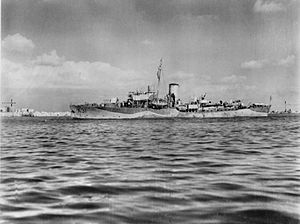HMS Camellia (K31)
This article needs additional citations for verification. (July 2011) |
 HMS Camellia with a convoy, 23 September 1943
| |
| History | |
|---|---|
| Name | HMS Camellia |
| Builder | Harland and Wolff[1] |
| Yard number | 1064[1] |
| Laid down | 14 November 1939 |
| Launched | 4 May 1940 |
| Completed | 18 June 1940[1] |
| Commissioned | 18 June 1940 |
| Identification | Pennant number: K31 |
| Fate | Sold to Dutch Company and renamed Hetty W Vinke 1946 |
| Status | Scrapped 19 September 1965 |
| General characteristics | |
| Class and type | Flower-class corvette |
HMS Camellia was a Flower-class corvette that served in the Royal Navy.
She was laid down on 14 November 1939, launched on 4 May 1940, and commissioned on 18 June 1940.
Operational service
In January 1941 Camelia served as a rescue transport for five crewman of the merchant ship Ringhorn which had gone down in stormy weather.
On 4 February 1941 Camellia and the destroyer Harvester picked up 121 survivors from HMS Crispin, sunk by U-107 (Korvettenkapitän Günther Hessler).
On 7 March 1941, serving as escorts for convoy OB 293 escort south-east of Iceland, Camellia and her sister ship Arbutus sank the German submarine U-70 (Kapitänleutnant Joachim Matz), and possibly the elusive U-47 (Oberleutnant Günther Prien) which was probably sunk the same day (other theories for the loss of U-47 include mines or being struck by her own torpedoes).
She was commanded by Lieutenant Charles Corneby from 6 June 1941 until August 1942, and by Lieutenant George Charlton from 29 July 1944 until the end of the war.
On Christmas Eve 1941, she saw unknown action and lost an indeterminate number of sailors listed as "killed in action".
Fate
In 1946 she was sold privately, and two years later was rechristened Hetty W Vinke.
References
Publications
Colledge, J. J.; Warlow, Ben (2006) [1969]. Ships of the Royal Navy: The Complete Record of all Fighting Ships of the Royal Navy (Rev. ed.). London: Chatham Publishing. ISBN 978-1-86176-281-8.
External links
